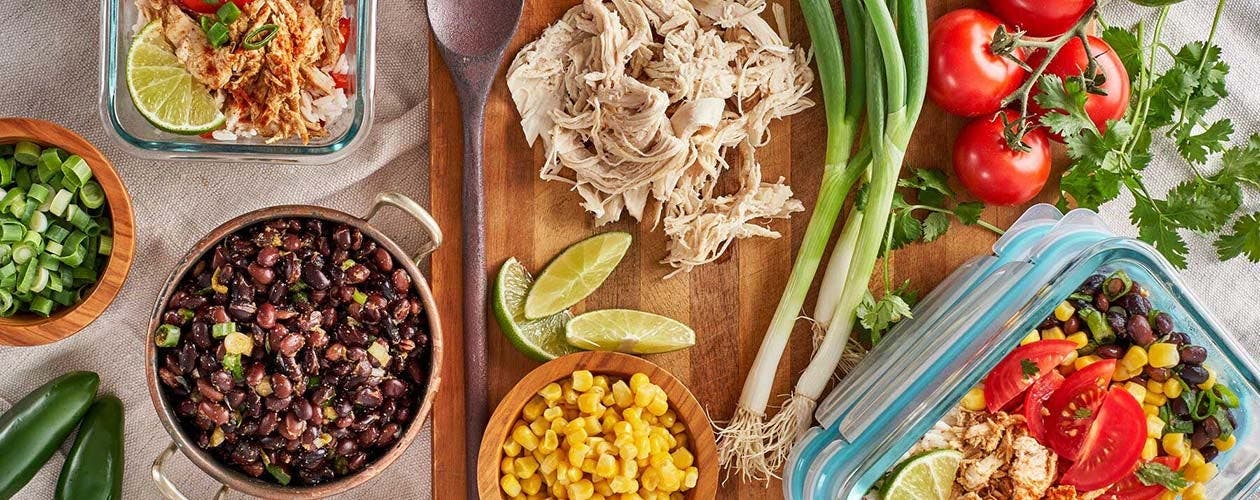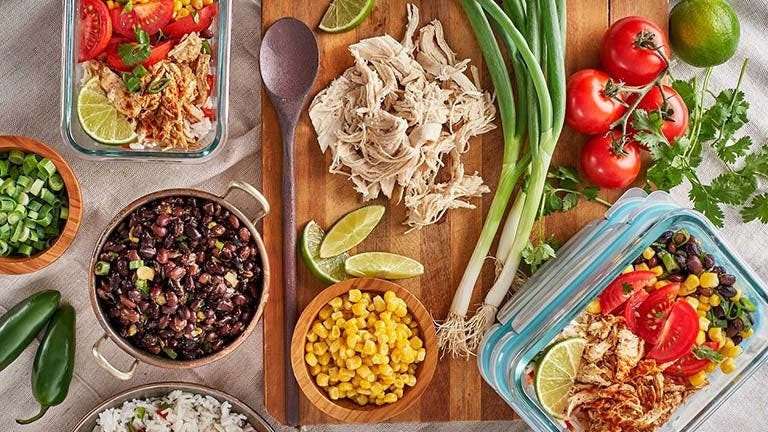7 ways to level up your meal-prep game


Meal planning comes with a multitude of benefits. It can help you stay on track, simplify trips to the supermarket, and cut down on time spent wondering, “What am I going to eat today?”, says WW Food Director Sherry Rujikarn. Basically, meal prep is a giant gift to Future You.
Bulk cooking differs from cooking on a smaller scale. That’s why we asked our food and nutrition experts to share their seven favourite hacks that can streamline meal prep and help you eat well for days.
1. Consider your actual needs.
First step: meal planning! Maybe you want to centre meal prep around your favourite recipes, just supersized - or perhaps there are new recipes you've been meaning to try.
It may also be useful to assess when you’d benefit most from eating a meal you made ahead of time. Are you busiest in the mornings? Consider prepping breakfast for the next few days. Are you regularly glued to your computer in midday meetings? Get a string of lunches ready to go. Is your family ravenous by 5:30? Prepping dinner is probably wise.
2. Normalise not doing everything on Sunday.
Sunday afternoons may seem like the default window for devoted meal prep, but if you’d rather do something else with your weekends, don't feel pressured into kitchen toil. Designate a day and time based on your schedule, even if that means first thing Tuesday mornings.
Quick tip: until you get the hang of things, consider blocking off more time than you think you need. Washing, prepping, cooking, and storing everything requires a larger window when you’re working with more food than usual.
3. Don’t be a DIY hero.
As you scale up your kitchen operations, the work that goes into larger-than-usual recipes can escalate quickly. Peeling and mincing a couple of garlic cloves for your favourite pasta dish may be a breeze, but quadruple that number for an eight-serving batch, and garlic suddenly becomes a Major Time Consideration.
Instead of panicking or ditching the recipe altogether, lean into convenience items that save you some gruntwork, says Jackie London, MS, RD, CDN, head of nutrition and wellness at WW. For example, frozen chopped vegetables can be game changers when it comes to getting nutrient-packed meals prepped and packed.
4. Platter as you prep.
Chopped ingredients can pile up quickly when you’re slicing and dicing for multiple meals. Rujikarn recommends transferring chopped ingredients to a large serving platter as you go, an alternative to using multiple little bowls. Not only can this help keep you organised; it also streamlines the clean-up by giving you just one thing to wash.
5. Build a stash of staples.
For go-to ingredients you use in all kinds of recipes, plan a session to prep them in bulk and freeze the surplus for later use. Create small portions by divvying ingredients into an ice cube tray, and then toss however many cubes you need into a hot pan whenever the time comes. (You might want to keep a dedicated tray on hand for this task, so your actual ice cubes don’t take on a faint tomato-sauce taste.)
6. On lazy days, just do sauces.
Don’t have the energy or time for major meal prep this week? We get it. As a plan B, consider making a few sauces for the week instead. A great sauce can completely transform a dish from basic to bursting with flavour without a huge time investment in advance, Rujikarn says.
You can spoon sauces on everything from leftover roasted veggies to a supermarket rotisserie chicken, and you may even already have most of the ingredients you need for simple, high-impact dressings. A bonus time-saving tip from Rujikarn: “For less clean-up when making sauces, mix them directly in the food containers you plan to refrigerate them in.”
7. Freeze meals before you’re sick of them.
No matter how excited you are for a certain dish at the beginning of the week, food fatigue is real. So know this: you don't necessarily need to eat an entire batch recipe on consecutive days. Instead, consider freezing some of your prepped meals. That way, you can just reheat and enjoy later on, when you’re actually in the mood to eat them again. Certain meals are particularly freezer-friendly, including chillies, casseroles, and pasta bakes.
Top food-freezing tips from Leslie Fink, MS, RD, WW nutritionist and recipe editor:
- For best results, freeze single portions instead of transferring everything to a large storage container.
- In the interest of food safety, be sure to label the date a dish was originally prepared.
- If you’re taking it straight from the oven to the freezer, portion it out, cool in the fridge, and then transfer to the freezer. “When properly frozen and stored, cooked food generally retains its quality for three to six months,” Leslie says.
